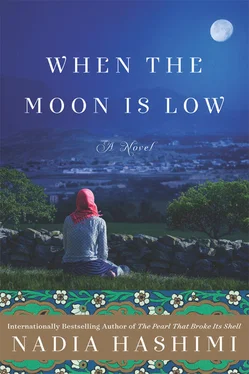The following morning, Saleem walked to the fly-infested latrines. The camp was quiet. It was just after sunrise and only a handful of men were awake. As he came around a cluster of tents, Saleem nearly walked straight into the old man he’d seen yesterday. The man smiled.
“Sohb-bakhair, bachem.”
“Good morning to you, too. Pardon me — I hadn’t seen you standing here.”
“The elderly become invisible sooner than we would hope,” he said, smiling.
“God forbid. It was my oversight,” Saleem said meekly. The man had to be in his seventies, at least, with thin, olive skin and a full white beard and mustache. The corners of his eyes crinkled under heavy, snowy brows. He wore a long beige tunic and pantaloons of a slightly darker shade.
“You have come recently,” he said. “What is your name and where are you from?”
“My name is Saleem Waziri. My family lived in Kabul.”
“Everyone here says they are from Kabul. But I can hear in your accent that you were raised there. Walk with me. I want to know more about you.”
Saleem followed, mesmerized by the soft rasp of the man’s voice. They strolled away from Ajmal’s hut and toward the far end of the camp, the side from which England’s chalky cliffs could be seen.
I feel like I know you, Saleem wanted to say. But he resisted and followed the man’s lead. They walked through the main pathway that crossed through the Jungle.
“A Kabuli family. Your father’s name?”
“Mahmood Waziri.” Saleem fiddled with the worn watchband on his wrist.
“Waziri. Mahmood Waziri? That name sounds awfully familiar. Let me see, do you mean Mahmood Waziri, the engineer? Worked for the Ministry of Water and Electricity?”
Saleem felt a tingle in his chest.
“Yes, yes! Did you know my father?” He stopped in his tracks and looked up at the old man’s face. His thin lips parted in a half smile.
“Do you not see these white hairs, my friend? I am old enough to have known more than just a few men. I know generations of men. I dare to say, much of Kabul’s history fills the space between my ears.”
Saleem grinned.
“Of course I knew your father. He’s not here with you.” A gentle statement more than a question.
“No, he was. . taken.” Saleem said it quickly, not wanting the words to linger.
“A shame, a true shame. Such an intelligent man. And your mother? She was a teacher. Where is she?”
“She is with my younger sister and brother. I think they’re in London. We were separated during our travels.”
“Ah, I see. God willing, your family is safely in London and anxiously awaiting your arrival. You’re brave to have made this voyage on your own. You must have seen many difficulties on your way here.”
“No more and no less than anyone else,” Saleem said, thinking of Ali. Naeem. The boys in Attiki. Patras. Pagani. The ones whose journey ended in the rocky waters. The ones who never made it out of Kabul.
“Wise of you to know this. We all cross a hundred peaks to get even this far. And there will be more before we each make it to whatever destination God has fated for us.”
“I worry about what God has fated for my little brother,” Saleem confessed, digging in the ground with the toe of his shoe. “He has a bad problem with his heart. We were able to get him some medicine in Turkey, but after that we couldn’t take him to any doctors.”
“There are things beyond our control, but there is reason behind the system, whether or not we choose to believe it. Let’s sit.” He led Saleem to some small boulders a few yards away. “Let us talk of things more pleasant than the fate of the Jungle. Saleem- jan, I knew your father by his reputation. He was a brilliant engineer, one of Kabul’s finest talents. Are you familiar with the work he was doing?”
“No, Uncle,” Saleem said respectfully. His face reddened at his own ignorance when it came to his father’s projects. “I only know it had something to do with water.”
The man was forgiving.
“You were young, no doubt. Your father’s area of expertise was bringing water to the outlying parts of Kabul and the surrounding areas. He had several ingenious irrigation projects that he pushed through the mountains of bureaucracy. And mountains of bureaucracy was when things were good.
“Later, there were much bigger obstacles in the way of his projects. There was no use trying to accomplish anything in Kabul at that time. People were scared. Nothing was happening. People were just trying to stay alive. When your father was killed, that left you and your mother to tend to the younger children?”
“Yes. We had no money. We weren’t sure if they would come after us and we felt trapped. We had to leave Kabul.”
“It’s never easy to leave one’s home, especially when there are only closed doors ahead of you.”
“My father left us with nothing. It was useless to stay there. Most of our family had already left. My aunt and uncle have been living in London. A normal life. Not like. . not like this. My cousins never saw things get bad in Kabul. That could have been our story too.”
Saleem hadn’t meant to sound as resentful as he did. It was a sentiment he tried to keep buried, but it resurfaced from time to time, especially when he felt exhausted by their journey.
“It is possible that if your father had led his family out of Kabul earlier, maybe your story would be different. Perhaps you would be living somewhere in Europe, accepted as asylum seekers. But only if that was the destiny that Allah had in store for you. And there’s something else you should realize. You think that it was futile for your father to stay in Kabul, to continue his work, but there are hundreds of people who would disagree with you.”
“What do you mean? Which people?”
“Which people? Why, the hundreds of people who had water because of him. The hundreds of people were able to survive because of him. He was the only person insisting on these projects, demanding them. Other people looked for their own interests, money and guns fattening their bellies instead of helping to feed the people of Kabul. That is the difference that your father made. He changed people’s lives. He never knew their names. He never saw their faces. But he saved their lives.”
“I didn’t know,” Saleem said, his voice muffled with guilt.
“You would not have known,” the old man gently replied.
Saleem stared at his shoes and blinked back tears.
It takes a lifetime to learn your parents. For children, parents are larger than life. They are strong arms that carry little ones, warm laps for sleepy heads, sources of food and wisdom. It’s as if parents were born on the same day as their children, having not existed a moment before.
As children inch their way into adolescence, the parent changes. He is an authority, a source of answers, and a chastising voice. Depending on the day, he may be resented, emulated, questioned, or defied.
Only as an adult can a child imagine his parent as a whole person, as a husband, a brother, or a son. Only then can a child see how his parent fits into the world beyond four walls. Saleem had only bits and pieces of his father, mostly the memories of a young boy. He would spend the rest of his life, he knew, trying to reconstruct his father with the scraps he could recall or gather from his mother.
But first, he had to admit the last year’s worth of memories were tainted by a discreet anger he harbored for Padar- jan for keeping them in Kabul when they should have escaped. Now Saleem had learned his father had done so because he knew the importance of his work. When he’d realized his family was in danger, he’d made plans to escape but by then it was too late.
Читать дальше












